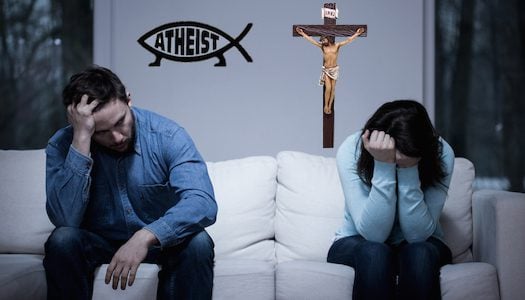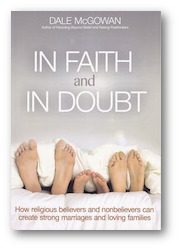By Dale McGowan
Author, In Faith and in Doubt
When I talk about red flags in the secular/religious marriage, somebody will reliably say, “Red Flag #1: You are in a secular/religious marriage.” It’d be a lot more clever if it were true. The supposed negative effect of mixed beliefs on a marriage has been grossly oversold for years, even as research continues to find that “the belief dissimilarity of spouses has little effect on the likelihood of dissolution” of a marriage.
This applies as well to the increasingly common union of religious believers and nonbelievers. As I wrote in the previous post, many couples in this mix experience very little conflict. In fact, the average length of marriage for participants in my survey of these couples was ten years so far — already well beyond the average length of 8 years for U.S. marriages. Many were beyond 25 years, and one couple had just celebrated 42 years.
But other such marriages are painful and difficult, and some even end as a direct result of the belief gap. To figure out why some succeed and others fail, you have to dig below the surface of the religious difference, as I did during the research for In Faith and in Doubt: How Religious Believers and Nonbelievers Can Create Strong Marriages and Loving Families.
Here are 8 things that can make a secular/religious relationship more difficult. They aren’t always terminal by any means, but couples with one or more of these situations will need to draw on other strengths to offset the challenges.
8 Red Flags to Watch for in the Secular/Religious Marriage
1. A couple shared a worldview when they married, then one partner changed.
Though never enough by itself, this was among the most consistent risk markers. The partner whose worldview is unchanged often feels that an agreement has been violated, unspoken or otherwise, one on which the very choice to marry was often predicated. The correlation between this factor and the tension markers in the survey conducted for this book was very high.
2. Both partners identify intensely or dogmatically with their respective worldviews.
If both partners are fairly moderate in the intensity of their worldview expression, tension and conflict tend to be low. Even if one is intensely engaged, the opportunity for compromise is still available. But when one partner is intensely religious and the other is intensely nonreligious, the issues multiply, and the opportunity for compromise diminishes. If the intensity is accompanied by dogmatism or a strong desire to convert, the strain on the relationship can be intense.
Dogmatism is not the same as intensity. It has nothing to do with how loud or confident you are, nor with the presence of written dogmas. It describes a person’s unwillingness to allow that he or she could conceivably be wrong. Written dogmas reflect this stance, but they don’t necessarily generate it. So yes, an atheist can indeed be dogmatic.
A person can be highly committed to a worldview, whether religious or nonreligious, and still retain some flexibility of thinking and a willingness to admit that he or she might be wrong. One dogmatic thinker in a marriage can be challenging. Two partners who are dogmatic on opposite ends is deadly.
3. One or both partners have a strong desire to convert the other.
It’s never a good idea to enter a relationship with the assumption or expectation that the other person will change. Because religious identity is less likely to change than most habits, and because it’s tied so tightly to personal identity, a persistent expressed desire to convert one’s partner causes resentment and alienation to build over time. In the survey, a strong desire by one or both partners to convert the other correlated strongly with tension and conflict in the relationship.
4. The secular partner identifies as an anti-theist.
Whether anti-theism is a justified position is a separate question. But the survey results were clear: those who self-identified as anti-theists were also more likely to report a higher level of tension and conflict with a religious partner.
5. The religious partner identifies with a conservative, dogmatic, or fundamentalist denomination.
A few denominations show an especially high correlation with tension and conflict in the secular/religious marriage. Mormonism, Jehovah’s Witnesses, Pentecostalism, and conservative Evangelical Protestants are among those with the highest levels of conflict and divorce in secular/religious matches, much of which takes the form of pressure or shunning by extended family.
6. The marriage already includes other high-risk factors.
If a relationship already includes one or more of the classic risk factors, religious differences can exacerbate the effect. General risks with a correlation to conflict and divorce include:
- Significant age difference between partners
- Young age at marriage (under 25, especially under 21)
- Parents’ history of divorce
- Alcoholism or other addiction by one partner or both
- Mismatched desire to have children, or more children
- Low overall life satisfaction/marital satisfaction
- Communication in general that is often disrespectful or contemptuous
7. The couple experiences significant disapproval from extended family and/or the community.
A Harvard study in 2012 found that strong outside disapproval puts serious stress on a relationship and even on the health of the individuals. “The more people felt like their family and friends and society didn’t approve of and support their relationship, the worse their health was,” said Justin Lehmiller, lead researcher on the study. And if the source of the tension is the religious difference between the partners, such disapproval can greatly increase existing tensions between them.
8. There is disagreement over religious identity, boundaries, and practices for children.
Many issues that lie dormant for a secular/religious couple prior to having kids come roaring to the surface once that Rubicon is crossed. It’s fine to say each partner can hold the beliefs he or she chooses, but what about the kids? Do they have a religious identity? Are they free to select their own in the long run? Do they go to Sunday school or religious services? Will they be baptized, confirmed, bar mitzvahed? Are any questions or opinions off limits? Secular/religious couples who do not come to agreement on these questions as early as possible—preferably before the kids are born—are in for some very strong shock waves, especially if one or both partners have a strong worldview identity.
Images via Shutterstock and EvolveFish
Adapted from In Faith and in Doubt: How Religious Believers and Nonbelievers Can Create Strong Marriages and Loving Families by Dale McGowan (2014)
DALE McGOWAN is the author of several books from the nonreligious perspective. He was Harvard Humanist of the Year in 2008 and founded the humanist charity Foundation Beyond Belief in 2010.
He is currently Content Development Editor and Atheist Channel Managing Editor at Patheos. He lives with his wife and children in Atlanta.












